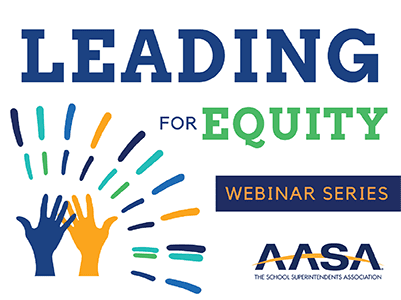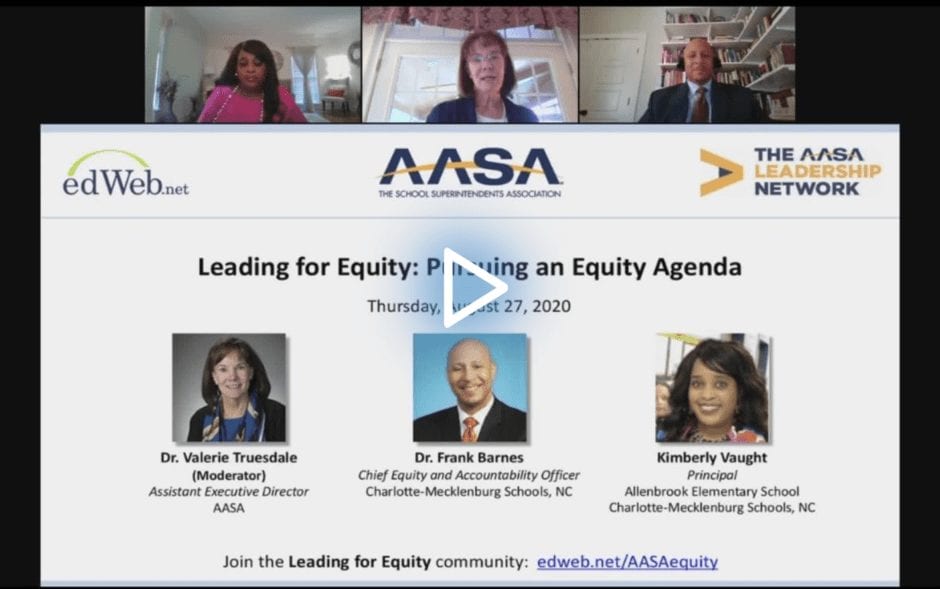Breaking the Link of Education Inequity Requires Courageous Conversations
By Stacey Pusey
While gaps in technology access were highlighted during the pandemic, many school and district leaders are trying to make strides with an even older issue: educational equity for children of all races and economic backgrounds. In the edWebinar, “Leading for Equity: Pursuing an Equity Agenda,” hosted by AASA, The Superintendents Association and AASA’s Leadership Network, Dr. Frank Barnes, Chief Equity and Accountability Officer, Charlotte-Mecklenburg Schools (CMS), and Kimberly Vaught, Principal, Allenbrook Elementary School, discussed their approach to building equity.
The equity initiative for CMS is based on their report, Breaking the Link. Originally published in 2018, it discussed the historical basis for education disparities as well as data points that could reliably predict student success. In the 2019 report, the authors examined three “levers” that could break the predictive outcomes and lead to higher achievement for all students: great teachers, time (instructional hours), and access to advanced coursework. However, in order for the district to succeed, they first had to gather data and have what Dr. Barnes called courageous conversations.
- Understand the history of education inequity in your state and district. Barnes observed that administrators can’t begin to address inequity if they don’t understand the causes. On a national level, for instance, the Coleman Report (1966) found achievement gaps were based in racist policies and systemic inequity that had persisted for decades. But more important to Dr. Barnes, not a single member of the Carolinian delegation voted in favor of the Civil Rights Act of 1964. In other words, historically, elected officials then didn’t want to address educational inequity and didn’t offer schools support in his district. Thus, some of those disparities exist in the schools today.
- Get good data on what progress has and hasn’t been made. Similarly, leaders need a variety of data points to show where the inequities are now. In his district, poverty has become a great predictor of performance. Recent data shows students in low-poverty schools outperform peers in moderate- and high-poverty schools. A deeper dive into the data also reveals students of color are still being outperformed by their white peers no matter the poverty concentration. So, while the district has made progress in closing the achievement gap, cross-examination of the results shows that the schools haven’t come as far as they would like.
- Get honest assessments of teacher practices. In a survey, 97% of the CMS teachers who responded said they thought they were teaching to the North Carolina education standards. Classroom observations showed, though, that only 24% were actually doing that. Rather than just making judgement on teaching skills, Vaught said administrators need to have fact-based conversations with faculty, explain what they’re doing that isn’t meeting the standards, and help them learn what to do.
- Communicate high expectations for everyone involved—teachers, staff, students, families, and community members. Vaught pointed out there is still racism in classrooms. Sometimes, there are low expectations for children of color, but sometimes, it’s just low expectations for all students. Be candid with teachers about what changes they need to take to break the cycle of expectations, she commented. Moreover, there shouldn’t just be expectations for student performance—leaders should also have high expectations for their teachers’ beliefs in the agenda, their actions to support it, and their commitment to it. Dr. Barnes added if students get access to great, appropriate teaching, they benefit, but that those that are behind grade level benefit the most.
- Speak the truth to all members of the community. Whether it’s parents, teachers, or the local news, always share the honest data about educational disparities, said Vaught. Rather than trying to cover anything up, schools should be open about where they are; then, they can have conversations about how they’re addressing inequities and ask for support.
Vaught emphasized, though, that there’s not a single program, practice, or solution. It’s about people over the process and product over the platform. More important, “The role of education must not be to solely produce readers, writers, scientists, and mathematicians. Rather, our end goal in this work must be to ensure those under our tutelage find their voice, their agency, their liberty and their freedom in the midst of problem solving all that comes with the daily work of muddling through what we know as the ‘human condition.’”
This edWeb broadcast was hosted by AASA, The Superintendents Association and AASA’s Leadership Network, providing premier professional learning for educational leaders.
This article was modified and published by eSchool News.
About the Presenters
Dr. Frank Barnes has served for over 25 years as an educator, researcher, and organizer. Currently, Dr. Barnes is the Chief Equity and Accountability Officer of the Charlotte-Mecklenburg Schools (CMS) in North Carolina. Dr. Barnes came to CMS from the Boston Public Schools where he was both a teacher, and later held the position of Chief Accountability Officer, where he led the design and rollout of the district’s school turnaround strategy. Prior to Boston, he was a senior associate at the Annenberg Institute for School Reform at Brown University, where he worked with urban school districts across the country helping them to examine and improve the conditions of schools. He has a BA from Macalester College, two master’s degrees—in teaching and curriculum and education policy and management—and a doctorate from the Harvard Graduate School of Education.
Mrs. Kimberly Vaught is the turnaround principal at Allenbrook Elementary School in the Charlotte-Mecklenburg School District. Mrs. Vaught most recently served as the inaugural principal at Lawrence Orr Elementary School where she led the school to perform in the top 2% of all schools in the State of North Carolina for several consecutive years and moved the school from a pending “F” status to a solid “B” over the course of four years. Mrs. Vaught led several turnaround initiatives and has a proven track record for developing school communities that have historically underperformed. Mrs. Vaught has worked in the Charlotte-Mecklenburg School District for 20 years. She holds a B.A. in Elementary Education and a Masters of Education in Reading Education from the University of North Carolina at Wilmington. Additionally, Mrs. Vaught earned a Masters of Education in School Administration from Gardner-Webb University.
About the Host
Dr. Valerie Truesdale joined AASA early in 2019 as Assistant Executive Director. She is responsible for guiding leadership development services and programs. With years of experience as an educational leader in roles of superintendent, chief transformation and technology officer, principal and teacher, she knows that AASA’s Leadership Network can be a substantial resource for school leaders trying to keep pace with the rapidly changing delivery of K-12 education.
Join the Community
Leading for Equity is a free professional learning community on edWeb.net for school and district leaders who face many challenges leading schools and driving school improvement for all students, especially now with COVID-19.
The AASA Leadership Network drives superintendent success, innovation and growth, shaping the future of public education while preparing students for what’s next. We are the largest, most diverse network of superintendents in America. Passionate and committed, we connect educational leaders to the professional learning, leadership development, relationships and partnerships they need to ensure a long career of impact.
Stacey Pusey is an education communications consultant and writer. She assists education organizations with content strategy and teaches writing at the college level. Stacey has worked in the preK-12 education world for 20 years, spending time on school management and working for education associations including the AAP PreK-12 Learning Group. Stacey is working with edWeb.net as a marketing communications advisor and writer.






Comments are closed.